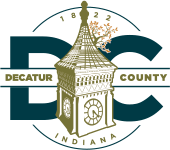Board of County Commissioners Legislative Body
Each county (except Marion County) is governed by a Board of three County Commissioners. In all except Lake and St. Joseph counties, the Commissioners are elected from separate commissioner districts by vote of the county as a whole. The Board of County Commissioners constitutes the legislative body of most counties for ordinance making purposes.
Districts
A prospective Commissioner must reside in a certain district but be elected by a majority vote of the county. In Lake and St. Joseph counties, however, each of the three Commissioners is elected by the voters in his own district. Commissioner districts must be redrawn at least once every 10 years, and may be redrawn in any odd-numbered year.
Terms
The terms of office of County Commissioners are four years on a staggered basis.
Ordinances
In general, the Board of County Commissioners is responsible for the administration of all county business. The Commissioners may enact ordinances to meet local conditions and exercise other authority vested in the Board by the legislature. The base salary for the Commissioners is established by the salary ordinance.
General Powers and Duties
Examples of the functions of the Board of County Commissioners include:
- Controlling, maintaining, and supervising county property, including courthouse, asylums, hospitals, library, jail, and the equipment and facilities incident thereto.
- Auditing and authorizing of claims against the county.
- Receiving of bids and authorization of contracts.
- Supervising of construction and maintenance of roads and bridges, including the power to establish a cumulative building or sinking fund to provide funds for the building and repair of bridges, establish county highway right-of-way widths, and to authorize the preparation of maps of county roads and the installation of road signs where there is no county plan commission to exercise this authority.
- Exercising the county’s power of eminent domain.
- Performing certain election functions, including the establishment of precincts, providing of polling places, and necessary equipment.
- Appointing county and township appointed officials as authorized by law, including the filling of vacancies. (However, most vacancies in elective offices are filled by party precinct committeemen.)
- Preparing that part of the annual budget over which County Commissioners exercise direct control.
- Serving, with the County Surveyor, as members of the County Drainage Board.
- Altering of township boundaries.
- Making recommendations to the County Council as to the amount of salary to be paid to each county officer (observing statutory minimums) and also as to the number of deputies and other employees which each official may hire, as well as the compensation to be paid deputies and employees.
- Making appointment(s) to the Wage Determination Committees of those public construction projects exceeding $150,000 in construction costs.
- Issuing of bonds or notes in connection with the borrowing of money for the county (subject to approval of the County Council).
- Establishing animal shelters and rabies-control projects.
- Fixing and posting speed limits and yield or stop signs on any street, road, highway, or dangerous railroad crossing within their jurisdiction.
- Authorizing financial assistance to non-profit community psychiatric clinics or other community facilities and services for the mentally ill.
- Passing ordinances incorporating towns.
- Establishing and maintaining an adequate system of books and records of the County Highway Department as prescribed by the State Board of Accounts.
- Designating preferential county highways and erecting stop signs at intersections.
- Adopting fire prevention ordinances.
- Establishing solid-waste districts and serving on the district boards, which are responsible for developing 20-year plans for the disposal, recovery, and reduction of solid waste. Those responsibilities include implementing recycling programs, operating disposal facilities, and developing financing mechanisms to meet state-imposed solid-waste-reduction goals.
- Enacting ordinances to require persons who own or lease property outside the corporate limits of any city or town, on which is located a building or buildings used for residential or business purposes, to connect to available sewer systems and to regulate the manner and method of disposal of domestic or sanitary sewage by private methods.
- Providing highway construction and maintenance on behalf of cities and towns within the county, if so authorized.
- Adopting ordinances and regulations to control the location, construction, or repair of all wells within the county.
- Making appointments to boards, commissioners, and other agencies, as provided by law.
- Providing park and recreation facilities.
- Furthering economic development.
- Providing veteran services.
- Furthering developing of land.
- Providing county fair and 4-H projects.
- Preserving cemeteries having no resources.
- Providing housing and building regulations.
- Assisting public transportation facilities.
- Providing planning and zoning.
Meetings
The law provides for the holding of regular monthly meetings by the Board of County Commissioners in each county. Decatur County Commissioners meet the first and third Monday of every month at 8 a.m. in the Commissioners Room located on the first floor of the Decatur County Courthouse. Meetings are open to the public. The schedule for regular meetings must be set at the first meeting in January.
General Powers
The Commissioners in their respective counties have the power at their meetings:
- To make orders respecting the property of the county, in accordance with the law; to sell the public grounds of the county upon which the public buildings are situated, and to purchase, in lieu thereof, in the name of the county, other grounds in the county seat on which such buildings may be erected; and purchase land and care for such property.
- To allow all accounts chargeable against such county not otherwise provided for.
- To audit the accounts of all officers having the care, management, collection, or disbursement of any monies belonging to the county or appropriated for its benefit, but only in conformity with existing law.
- To grant licenses or franchises with respect to the use of county property.
Serves as Finance Board
In every county except Marion, the Board of County Commissioners serves as a County Board of Finance. The Board of Finance has general supervision over all funds of the county.
- To designate banks as depositories of county funds after inviting the banks of the county to make their proposals to become depositories.
- To receive monthly statements from all depositories and the Board may, at any time, revoke the commission of any depository, subject to the latter’s right to appeal to the Circuit or Superior Court.
- To make statements to the State Board of Depositories which manages the Indiana Public Deposits Insurance Fund.
Authorizes Warrants
No warrant may be drawn by the auditor and no funds may be paid out of the county treasury in payment of any claim unless it has been fully itemized and its correctness verified by the claimant, or someone in his behalf, and filed with the Auditor more than five days before the first day of the session of the Board of County Commissioners at which payment is to be considered.
Adopts Rules
The Board of Commissioners must adopt regulations for the transaction of business and in the trial of cases it must comply, so far as practicable, with the rules for conducting businesses in the Circuit Court.
Maintains Courthouse, Offices, and Jail
The Commissioners must furnish and maintain a courthouse, jail, and public offices for the elected county officials. All records and papers required by law to be made by such offices must be kept and preserved and delivered to the respective successor of each office.
Audits Books
The Board of Commissioners must audit the books of the County Treasurer and County auditor, and compare the allowances with the stubs, vouchers, or registers of warrants drawn by the Auditor in payment of such allowances. The Board also shall examine all warrants redeemed by the County Treasurer and turned over to the County Auditor, for which the County Treasurer claims credit, with the corresponding stubs, vouchers, or register, seeing that such warrants are properly canceled so they cannot again be put in circulation, and that a proper accounting has been made between such officers of all funds. In practice, this function is exercised by the State Board of Accounts.
Issuance of Bonds
Whenever it is necessary to construct, complete, or repair the courthouse, jail, or other county buildings; construct grade separation structures, or whenever it may be desirable to fund or average any existing debt incurred for county purposes where revenues available from reasonable taxation are insufficient, the County Commissioners acting with the County Council may borrow money for that purpose. However, the total bonded debt of a county may not exceed 2 percent of the assessed valuation of the real and personal property of the county, and bonds can be issued only in accordance with restrictions and under condition set up in statues governing such actions. The board of County Commissioners may, at its discretion, provide for the payment of interest on issues of bonds in annual or semiannual installments. The Board of Commissioners provides by taxation for the annual payment of the interest accruing on all bonds sold.
Alters Watercourses
The Board of County Commissioners has the power to straighten or change the course, direction, or location of the channel of any stream or body of water, and to change any watercourse, or the flow of any stream or body of water within the limits of the county. However, this power is limited by rule and regulation of the Indiana Department of Natural Resources. The Commissioners are empowered to authorize the county highway supervisor to use county equipment on private property for ditching, grading, or hauling gravel for roads when the equipment is in the vicinity of such property. A schedule of charges is established for this work.
Establishes Parks
The Board of Commissioners is authorized to purchase, or otherwise acquire, any lands within such county for park purposes, or to accept on behalf of the county, any lands which may be granted or conveyed to the county for park purposes and to make the necessary improvements thereon. The Commissioners may establish parks or recreation centers in cooperation with cities, towns, and school corporations and the Boards of Commissioners of two or more counties may create joint parks.
Constructs Public Halls
The Board of County Commissioners has the power to construct and maintain public halls and has power to purchase real estate on which to locate such halls and to raise revenue necessary by levying a tax on all property in the county subject to taxation. County Commissioners are also authorized to join with the County Council and the City Council of the county seat in formation of a County Building Authority. This authority is empowered to finance, construct, and manage buildings for public or governmental purposes.
Constructs War Memorials
County commissioners may establish memorials, parks, and artificial lakes as World War memorials, either singly or jointly, with any city within the county.
Erects Historical Markers
The County Commissioners may provide for erection of historical markers upon petition received from local civic or historical organizations. Such markers and the inscription must be approved by the Indiana Historical Society.
Leases Surplus County Real Estate
County Commissioners have the power to lease surplus real estate belonging to the county for any public use approved by the Commissioners, including constructing, maintaining, and operating recreational facilities, such as public golf courses and public swimming pools, all at the lessee’s expense, provided that all improvements made to the leased real estate shall become the property of the county on termination of the lease. Prior to the execution of such lease, the real estate must be properly appraised and a public hearing held.
Property Sales by Public Auction
The Board of County Commissioners may not sell any county personal property with a value of $500 or more except at public auction.
Sale of Property to State
Whenever any county owns any real estate upon which is situated, any courthouse, public office building, or any other building used for public purposes, which the state of Indiana may desire to buy, the Board of Commissioners may sell this real estate to the State of Indiana.
Landfills
Soil and Water Conservation Districts are required to inspect every landfill located in a county at least twice a year for compliance with rules concerning sediment control and erosion. The individual conducting the inspection on behalf of the Soil and Water Conservation District will send a written report to the County Commissioner, the Commissioner of the Department of Environmental Management, and the Director of the Division of Soil Conservation in the Department of Natural Resources.
Poor Relief Duties
If any person believes he or she is entitled to assistance for the poor which a Township Trustee refuses to provide, the Board of County commissioners must grant such person a hearing, if requested, and if it deems proper, direct the Trustee to grant aid. Any applicant for poor relief or any taxpayer of such county has the right of an appeal from the findings of the Board of County Commissioners to the Circuit Court or Superior Court of the county on the granting or rejection of any application and the modification of, or the failure to modify, any award.
Regulates Food Establishments
County Commissioners may regulate and establish minimum standards for the operation of food establishments. Ordinances adopted in this manner must not conflict with those issued by the State Board of Health and are not effective in cities and towns maintaining their own health departments unless they elect to come under such ordinances. The Commissioners are also authorized to regulate other health factors outside the corporate limits of cities and towns.
Relocates and Vacates Highways
Power to change, vacate, or open any highway in any township is vested in the County Commissioners under specific regulations as to the petition, notice, appointment of viewers, and assessment of damages.
Burial of Soldiers, Sailors, and Marines
County Commissioners are authorized to provide for the burial of members of the armed forces who have received honorable discharges and also for the spouse of the honorably discharged veteran. The maximum allowance is $100.
County Forests
The County Commissioners may levy taxes for the purchase and maintenance of county forests.


